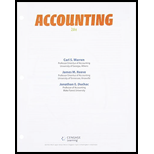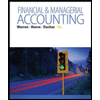
1.
Bonds: Bonds are long-term promissory notes that are represented by a company while borrowing money from investors to raise fund for financing the operations.
Bonds Payable: Bonds payable are referred to long-term debts of the business, issued to various lenders known as bondholders, generally in multiples of $1,000 per bond, to raise fund for financing the operations.
Discount on bonds payable: It occurs when the bonds are issued at a low price than the face value.
Straight-line amortization method: It is a method of bond amortization that spreads the amount of the bond discount equally over the interest period.
To prepare:
1.
Explanation of Solution
Prepare journal entry for cash proceeds from the issuance of the bonds on July 1, 2016.
| Date | Account Title and Explanation | Post Ref | Debit ($) | Credit ($) | |||
| July 1, 2016 | Cash | 42,309,236 | |||||
| Discount on Bonds Payable (1) | 3,690,764 | ||||||
| Bonds Payable | 46,000,000 | ||||||
| (To record issuance of bonds payable at discount) | |||||||
Table (1)
Working note:
Calculate discount on bonds payable.
- Cash is an asset and it is increased. So, debit it by $42,309,236.
- Discount on Bonds Payable is an adjunct liability account and it is decreased. So, debit it by $3,690,764.
- Bonds payable is a liability and it is increased. So, credit it by $46,000,000.
2 (a)
To prepare: Journal entry to record first interest payment and amortization of bond discount on December 31, 2016
2 (a)
Explanation of Solution
Prepare journal entry for first interest payment and amortization of discount on bonds.
| Date | Account Title and Explanation | Post Ref | Debit ($) | Credit ($) | |||
| 2016 | Interest Expense (4) | 2,392,269 | |||||
| December | 31 | Discount on Bonds Payable (2) | 92,269 | ||||
| Cash (3) | 2,300,000 | ||||||
| (To record semiannual payment of interest and amortization of discount on bonds) | |||||||
Table (2)
Working notes:
Calculate discount on bonds payable semiannually.
Calculate the amount of cash interest.
Calculate the interest expense on the bond.
- Interest expense is an expense and it decreases the equity value. So, debit it by $2,392,269.
- Discount on Bonds Payable is an adjunct liability account and it is increased. So, credit it by $92,269.
- Cash is an asset and it is decreased. So, credit it by $2,300,000.
2 (b)
To prepare: Journal entry to record second interest payment and amortization of bond discount on June 30, Year 2.
2 (b)
Explanation of Solution
Prepare journal entry for second interest payment and amortization of discount on bonds.
| Date | Account Title and Explanation | Post Ref | Debit ($) | Credit ($) | |||
| Year 2 | Interest Expense (7) | 2,392,269 | |||||
| June | 30 | Discount on Bonds Payable (5) | 92,269 | ||||
| Cash (6) | 2,300,000 | ||||||
| (To record semiannual payment of interest and amortization of discount on bonds) | |||||||
Table (3)
Working notes:
Calculate discount on bonds payable semiannually.
Calculate the amount of cash interest.
Calculate the interest expense on the bond.
- Interest expense is an expense and it decreases the equity value. So, debit it by $2,392,269.
- Discount on Bonds Payable is an adjunct liability account and it is increased. So, credit it by $92,269.
- Cash is an asset and it is decreased. So, credit it by $2,300,000.
3.
The amount of total interest expense for 2016.
3.
Explanation of Solution
Determine the amount of total interest expense for 2016.
Hence, the amount of total interest expense for 2016 is $2,392,269.
4.
To explain: The situation when contract rate of bond is less than the market rate of interest.
4.
Explanation of Solution
Yes, the bond proceeds will always be less than the face amount of bonds when the contract interest rate is less than the market interest rate.
If the stated interest rate of a bond is less than the market interest rate, then the bonds is issued at discount. This is because the bonds is less valuable in market and investors is ready to pay less than the maturity
5.
To calculate: The amount of cash proceeds (present value) from the sale of the bonds using present value tables.
5.
Explanation of Solution
Determine the amount of cash proceeds (present value) from the sale of the bonds.
Step 1: Calculate the semiannual interest on bonds.
Step 2: Calculate the present value of interest.
| Particulars | Amount |
| Interest payment (a) | $2,300,000 |
| PV factor at semiannual market interest rate of 5.5% for 40 periods (b) | 16.04612 |
Present value [(a) × (b)] |
$36,906,076 |
Table (4)
Note: Refer Appendix A in the text book for present value factor.
Step 3: Calculate the present value of lump sum payment of $46,000,000 (principal amount) at 5.5% for 40 periods.
| Particulars | Amount |
| Single payment (a) | $46,000,000 |
| PV factor at semiannual market interest rate of 5.5% for 40 periods (b) | 0.11746 |
Present value [(a) × (b)] |
$5,403,160 |
Table (5)
Note: Refer Appendix A in the text book for present value factor.
Step 4: Calculate the amount of cash proceeds from the sale of the bonds.
Thus, the amount of cash proceeds from the sale of the bonds is $42,309,236
Want to see more full solutions like this?
Chapter 14 Solutions
Bundle: Accounting, Loose-Leaf Version, 26th + CengageNOWv2, 2 term Printed Access Card
- Gemini Store has operated with a 30% average gross profit ratio for a number of years. It had $112,000 in sales during the second quarter of this year. If it began the quarter with $19,200 of inventory at cost and purchased $73,200 of inventory during the quarter, what is its estimated ending inventory by the gross profit method?arrow_forwardI don't need ai answer general accounting questionarrow_forwardI need help with accounting questionarrow_forward
- Principles of Accounting Volume 1AccountingISBN:9781947172685Author:OpenStaxPublisher:OpenStax College
 Financial AccountingAccountingISBN:9781305088436Author:Carl Warren, Jim Reeve, Jonathan DuchacPublisher:Cengage Learning
Financial AccountingAccountingISBN:9781305088436Author:Carl Warren, Jim Reeve, Jonathan DuchacPublisher:Cengage Learning Excel Applications for Accounting PrinciplesAccountingISBN:9781111581565Author:Gaylord N. SmithPublisher:Cengage Learning
Excel Applications for Accounting PrinciplesAccountingISBN:9781111581565Author:Gaylord N. SmithPublisher:Cengage Learning  Financial Accounting: The Impact on Decision Make...AccountingISBN:9781305654174Author:Gary A. Porter, Curtis L. NortonPublisher:Cengage Learning
Financial Accounting: The Impact on Decision Make...AccountingISBN:9781305654174Author:Gary A. Porter, Curtis L. NortonPublisher:Cengage Learning College Accounting, Chapters 1-27AccountingISBN:9781337794756Author:HEINTZ, James A.Publisher:Cengage Learning,
College Accounting, Chapters 1-27AccountingISBN:9781337794756Author:HEINTZ, James A.Publisher:Cengage Learning, Financial & Managerial AccountingAccountingISBN:9781285866307Author:Carl Warren, James M. Reeve, Jonathan DuchacPublisher:Cengage Learning
Financial & Managerial AccountingAccountingISBN:9781285866307Author:Carl Warren, James M. Reeve, Jonathan DuchacPublisher:Cengage Learning





